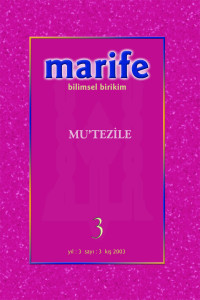Kâdî Abdülcebbâr’a Göre Dilsel Delâlet
Abstract
There are two kinds of significations from the point of connection between the parts of signification (ad-daal and al-madluul). The first one is what might be called "natural signification," (al-dalalah al- tabe‘yyah) which is a type of signification according to which existence (al-Mawjuud) signifies the creator; hence more logically oriented. The second one can be translated as "positive signification" (al-dalalah al-wad‘yyah). Qadi Abd al-Jabbar considers linguistic signification within the framework of positive signification. Al-Jabbar’s theory of linguistic signification presupposes that the meaning of a text is determined not only by consensus but by the intention of the author/speaker as well. Since while consensus is necessary to determine the meaning of the word, the notion of the intention of the au-thor/speaker is necessary to determine the meaning of the sentence. Therefore, to determine the meaning of the sentence it is necessary that both the notion of consensus and of the intention of the author/speaker should be considered. This article, therefore, attempts to examine al-Jabbar’s "theory of linguistic signification," (Al-dalalah al-lugaweyyah) and to determine the way in which he used his theory as a tool in his Qur’anic hermeneutics.
References
- ......................................................................................................................................................................................................................................
Details
| Primary Language | Turkish |
|---|---|
| Subjects | Religion, Society and Culture Studies |
| Journal Section | Research Article |
| Authors | |
| Publication Date | December 31, 2003 |
| Published in Issue | Year 2003 Volume: 3 Issue: 3 |
This work is licensed under a Creative Commons Attribution-NonCommercial 4.0 International License.

